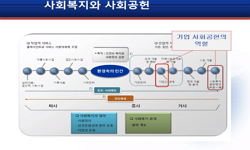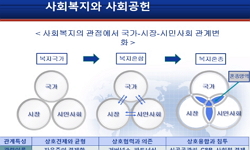조직이론을 포함한 경영관리 및 기업가정신 연구 영역의 연구자들은 혼합조직으로서 사회적 기업이 갖는 특성을 가정하여 사회적 기업의 행태 및 성과에 관한 다양한 연구를 진행하고 있다...
http://chineseinput.net/에서 pinyin(병음)방식으로 중국어를 변환할 수 있습니다.
변환된 중국어를 복사하여 사용하시면 됩니다.
- 中文 을 입력하시려면 zhongwen을 입력하시고 space를누르시면됩니다.
- 北京 을 입력하시려면 beijing을 입력하시고 space를 누르시면 됩니다.

혼합조직으로서의 사회적 기업의 사회적 가치와 경제적 가치 추구 특성에 관한 연구 = A Study on the Pursuit of Social and Economic Values in Social Enterprises as Hybrid Organizations
한글로보기https://www.riss.kr/link?id=A107881465
- 저자
- 발행기관
- 학술지명
- 권호사항
-
발행연도
2021
-
작성언어
-
- 주제어
-
등재정보
KCI등재
-
자료형태
학술저널
- 발행기관 URL
-
수록면
75-90(16쪽)
-
KCI 피인용횟수
0
- 제공처
-
0
상세조회 -
0
다운로드
부가정보
국문 초록 (Abstract)
조직이론을 포함한 경영관리 및 기업가정신 연구 영역의 연구자들은 혼합조직으로서 사회적 기업이 갖는 특성을 가정하여 사회적 기업의 행태 및 성과에 관한 다양한 연구를 진행하고 있다. 하지만 기존 관련 연구들이 가정하고 있는 사회적 기업의 이중가치, 즉 경제적 가치와 사회적 가치 추구 특성에 관한 근원적 연구는 부족하다고 판단된다. 이에 본 연구는 기존 조직이론 및 경영관리 문헌에 기반하여 혼합조직으로서의 사회적 기업이 갖는 이중가치 추구 특성을 일반 영리기업, 비영리조직과 비교 분석하였다. 실증 분석을 위해 한국의 사회적 기업과 영리기업, 비영리조직을 대상으로 조사된 ‘사회적 가치 서베이’ 자료를 활용하였으며, 이들 세 유형의 조직이 가지고 있는 ‘이중가치 추구 지향성’과 ‘이중가치 실현을 위한 조직운영’의 강도를 측정하여 비교하였다. 분석 결과 ‘이중가치 통합 지향’은 세 유형의 조직 중 사회적 기업이 가장 약한 것으로 나타났으며, ‘이중가치 실현을 위한 조직운영’과 관련하여서는 세 유형의 조직 중 사회적 기업이 가장 균형적으로 실행하고 있는 것으로 나타났다. 본 연구는 한국의 사회적 기업을 대상으로 한 실증분석을 통해 기존 관련 연구들이 가정했던 사회적 기업의 조직 혼합성을 영리기업, 비영리조직과 비교하여 보여주었다는 점에서 함의를 가진다.
다국어 초록 (Multilingual Abstract)
Organization and management scholars have researched social enterprises as hybrid organizations. However, research on the organizational uniqueness of social enterprises as hybrids is limited, especially comparing their organizational characteristics ...
Organization and management scholars have researched social enterprises as hybrid organizations. However, research on the organizational uniqueness of social enterprises as hybrids is limited, especially comparing their organizational characteristics with other traditional types of organizations. Thus, this study attempted to compare social enterprises with traditional for-profit and not-for-profit organizations in the aspect of their organizational hybridity by using the data of the Social Value Survey. The results showed that the orientation of social enterprises in pursuing dual values is weaker than the other two types of organizations. Meanwhile, the results revealed that the extent to which an organization operates for realizing dual values is strongest in social enterprises among the three types of organizations. These findings add to the understanding of social enterprises’ organizational hybridity in organization and management studies.
참고문헌 (Reference)
1 정선희, "하이브리드 요인이 사회적기업 성과에 미치는 영향: 사회적기업가 정신의 매개효과를 중심으로" 사단법인 사회적기업학회 11 (11): 125-161, 2018
2 조희진, "사회적 기업의 지속가능성과 사회적 기업가 정신" 한국정책학회 25 (25): 329-358, 2016
3 황정윤, "사회적 기업 지원의 딜레마 - 정부보조금, 약인가 독인가 -" 한국정책학회 26 (26): 225-258, 2017
4 Poole, M. S, "Using paradox to build management and organization theories" 14 (14): 562-578, 1989
5 Smith, W. K, "Toward a theory of paradox: A dynamic equilibriu m model of organizing" 36 (36): 81-403, 2011
6 Glynn, M. A., "The sage handbook of organizational institutionalism" Sage 413-430, 2008
7 Ebrahim, A., "The governance of social enterprises: Mis sion drift and accountability challenges in hybrid organizations" 34 : 81-100, 2014
8 Dacin, P. A., "Social entrepreneurship: Why we don't need a new theory and how we move forwar d from here" 24 (24): 37-57, 2010
9 Dacin, M. T., "Social entrepreneurship: A critique and future directions" 22 (22): 1203-1213, 2011
10 Saebi, T., "Social entrepreneurship research: Past achieveme nts and future promises" 45 (45): 70-95, 2019
1 정선희, "하이브리드 요인이 사회적기업 성과에 미치는 영향: 사회적기업가 정신의 매개효과를 중심으로" 사단법인 사회적기업학회 11 (11): 125-161, 2018
2 조희진, "사회적 기업의 지속가능성과 사회적 기업가 정신" 한국정책학회 25 (25): 329-358, 2016
3 황정윤, "사회적 기업 지원의 딜레마 - 정부보조금, 약인가 독인가 -" 한국정책학회 26 (26): 225-258, 2017
4 Poole, M. S, "Using paradox to build management and organization theories" 14 (14): 562-578, 1989
5 Smith, W. K, "Toward a theory of paradox: A dynamic equilibriu m model of organizing" 36 (36): 81-403, 2011
6 Glynn, M. A., "The sage handbook of organizational institutionalism" Sage 413-430, 2008
7 Ebrahim, A., "The governance of social enterprises: Mis sion drift and accountability challenges in hybrid organizations" 34 : 81-100, 2014
8 Dacin, P. A., "Social entrepreneurship: Why we don't need a new theory and how we move forwar d from here" 24 (24): 37-57, 2010
9 Dacin, M. T., "Social entrepreneurship: A critique and future directions" 22 (22): 1203-1213, 2011
10 Saebi, T., "Social entrepreneurship research: Past achieveme nts and future promises" 45 (45): 70-95, 2019
11 Mair, J, "Social entrepreneur ship research: A source of explanation, prediction, and delight" 41 (41): 36-44, 2006
12 Austin, J., "Social and commercial entrepreneursh ip: Same, different, or both?" 30 (30): 1-22, 2006
13 Doherty, B., "Soci al enterprises as hybrid organizations: A review and research agenda" 16 (16): 417-436, 2014
14 Short, J. C., "Research in social entrepreneurship: Past contributions and future opportunities" 3 (3): 161-194, 2009
15 Quinn, R. E, "Paradox and transformation: Toward a theory of change in organization and management" Ballinger 1988
16 Jay, J., "Navigating paradox as a mechani sm of change and innovation in hybrid organizations" 56 (56): 137-159, 2013
17 Besharov, M. L, "Multip le institutional logics in organizations: Exp laining their varied nature and implications" 39 (39): 364-381, 2014
18 Smith, W. K., "Managing social-business tensions: A review and research agenda for social enter prise" 23 (23): 407-442, 2013
19 Ismail, A, "Managing organizational paradoxes in social enterpri ses: Case studies from the MENA Region" 30 (30): 516-534, 2019
20 Santos, F., "Making hybrids work: Aligning business models and organizational design for social enterprises" 57 (57): 36-58, 2015
21 Lok, J., "Institutional logics as identity projects" 53 (53): 1305-1335, 2010
22 Pache, A.-C, "Inside the hybrid organization: Selective coupling as a response to competing institutional logics" 56 (56): 972-1001, 2013
23 Battilana, J., "In search of the hybrid ideal" 10 (10): 50-55, 2012
24 Smith, S. R, "Hybridization and non-prof it organizations: The governance challenge" 29 (29): 219-229, 2010
25 Brandsen, T, "Hybrid organizations: No cause for concern?" 34 (34): 827-836, 2011
26 Battilana, J., "Harnessing productive tens ions in hybrid organizations: The case of work integration social enterprises" 58 (58): 1658-1685, 2015
27 Lewis, M. W., "Exploring paradox: Towa rd a more comprehensive guide" 25 (25): 760-776, 2000
28 Park, J. -H, "Chasing two rabbits: How social enterprises as hybrid organizations manage paradoxes" 19 (19): 407-437, 2020
29 Battilana, J, "Building sustainable hybrid organizations: The case of commercial microfinance organizations" 53 (53): 1419-1440, 2010
30 Tracey, P., "Bridging institutional entrepreneurship a nd the creation of new organizational form s: A multilevel model" 22 (22): 60-80, 2011
31 Smith, W. K., "Bowin g before dual gods: How structured flexibil ity sustains organizational hybridity" 64 (64): 1-44, 2019
32 Battilana, J., "Advancing rese arch on hybrid organizing: Insights from the study of social enterprises" 8 (8): 397-441, 2014
동일학술지(권/호) 다른 논문
-
중국 제조업 수출기업의 국제 기업가 지향성이 수출 성과에 미치는 영향: 흡수 능력의 매개효과를 중심으로
- 한국중소기업학회
- 진우이 ( Yuyi Chen )
- 2021
- KCI등재
-
기술수준에 따른 서비스업 혁신 중소기업의 생존기간 비교분석
- 한국중소기업학회
- 이준원 ( Lee Jun-won )
- 2021
- KCI등재
-
소기업의 R&D역량이 조직역량 및 R&D사업화에 미치는 영향
- 한국중소기업학회
- 김선하 ( Sun-ha Kim )
- 2021
- KCI등재
-
협동조합 이사회의 공동심리소유권과 조직성과: 공유리더십의 매개효과를 중심으로
- 한국중소기업학회
- 박지아 ( Ji-a Park )
- 2021
- KCI등재
분석정보
인용정보 인용지수 설명보기
학술지 이력
| 연월일 | 이력구분 | 이력상세 | 등재구분 |
|---|---|---|---|
| 2027 | 평가예정 | 재인증평가 신청대상 (재인증) | |
| 2021-01-01 | 평가 | 등재학술지 유지 (재인증) |  |
| 2018-01-01 | 평가 | 등재학술지 유지 (등재유지) |  |
| 2015-01-01 | 평가 | 등재학술지 유지 (등재유지) |  |
| 2011-01-01 | 평가 | 등재학술지 유지 (등재유지) |  |
| 2009-01-01 | 평가 | 등재학술지 유지 (등재유지) |  |
| 2007-01-01 | 평가 | 등재학술지 유지 (등재유지) |  |
| 2005-01-01 | 평가 | 등재학술지 유지 (등재유지) |  |
| 2002-01-01 | 평가 | 등재학술지 선정 (등재후보2차) |  |
| 1999-07-01 | 평가 | 등재후보학술지 선정 (신규평가) |  |
학술지 인용정보
| 기준연도 | WOS-KCI 통합IF(2년) | KCIF(2년) | KCIF(3년) |
|---|---|---|---|
| 2016 | 1.08 | 1.08 | 1.07 |
| KCIF(4년) | KCIF(5년) | 중심성지수(3년) | 즉시성지수 |
| 1.1 | 1.13 | 1.521 | 0.36 |





 KCI
KCI KISS
KISS






